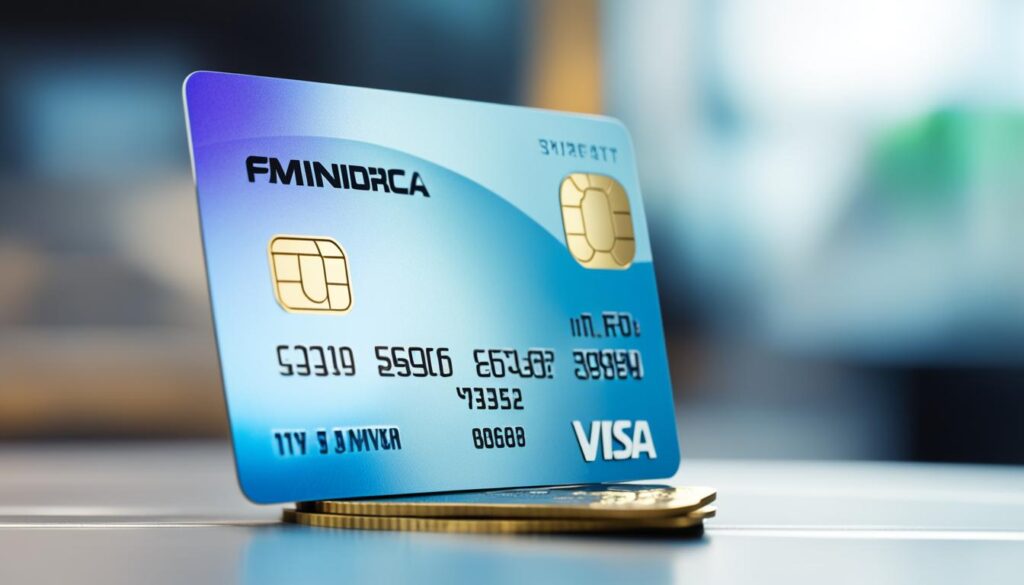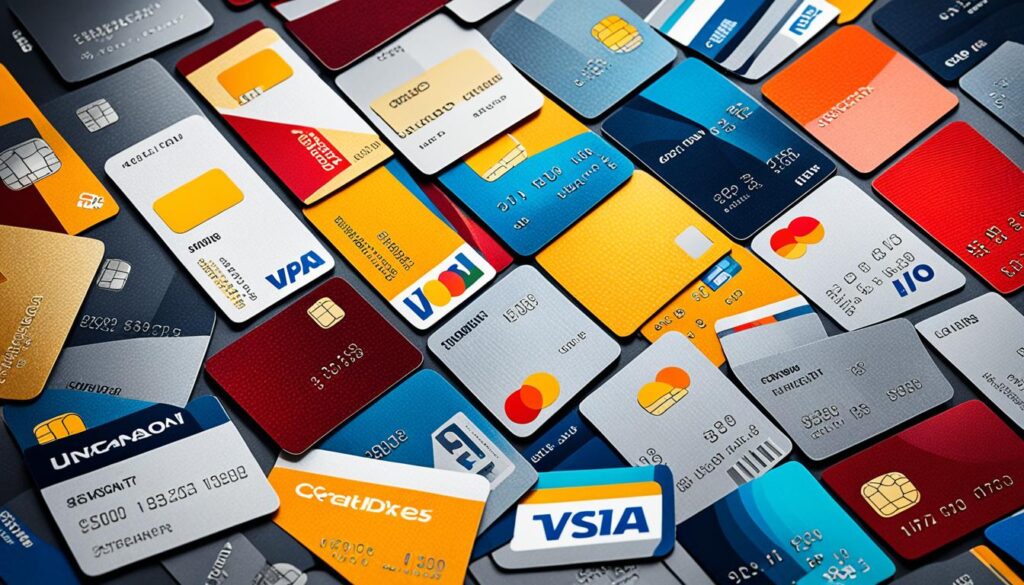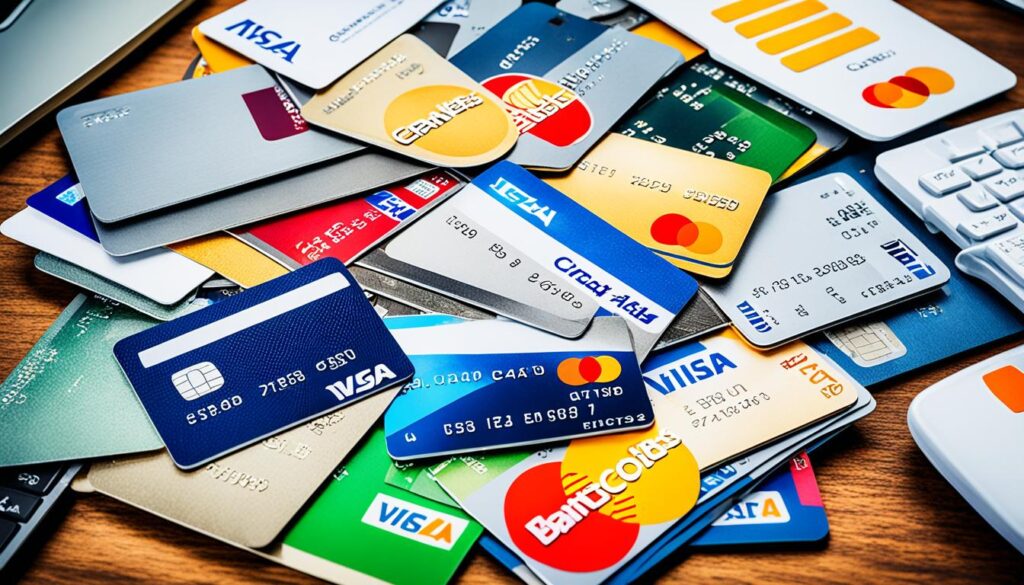A business credit card is a powerful asset for small-business owners. It offers secure and flexible financial support for your company’s needs. You can earn rewards, get big sign-up bonuses, and finance large buys without interest.
Applying for one might seem hard at first, especially for new business owners. But with some preparation, you can get a card in three easy steps. We’ll look at how you can choose a business credit card that works best for you.
Key Takeaways:
- A business credit card is a valuable financial tool for small-business owners.
- It allows you to earn rewards, access sign-up bonuses, and finance large purchases interest-free.
- Getting a business credit card can seem overwhelming, but it can be done in three steps with proper preparation.
- By choosing the right business credit card, you can maximize your benefits and enhance your company’s financial flexibility.
- Stay tuned as we explore the eligibility criteria and different types of business credit cards that are available to small-business owners.
Assess Your Eligibility
Ensuring you’re eligible is key when applying for a small-business credit card. Most cards check your personal credit score first. This is true no matter if you’re new in business or have been around a while. For many small-business cards, you’ll need a good or excellent credit score, usually 690 or higher.
If your credit isn’t great, you can still get a card. Secured business cards are available. They need a security deposit. This deposit lowers the risk for the card issuer. It’s a good choice to improve your credit score.
Startups and new businesses without strong personal credit have other options. Cards like Brex or Ramp look at your business’s financial health. This includes your revenue. They might be a better choice for your new venture.
Choosing the Right Business Credit Card
Choosing the right card involves looking at your business’s needs. Think about what you spend money on. Consider the benefits each card offers, like cashback or rewards. Compare different cards to find the best fit for your business.
Secured Business Cards for Bad Credit
For those with bad personal credit but who need a business credit card, secured cards are a good option. You must deposit cash as security. This makes the card safer for the issuer. With responsible use, you can increase your credit score. This could lead to better cards with more benefits.
| Types of Business Credit Cards | Eligibility Requirements |
|---|---|
| Unsecured Business Cards | – Good or excellent personal credit score – Established business and credit history |
| Secured Business Cards | – No credit history or bad personal credit score – Ability to provide a security deposit |
| Corporate Cards (e.g., Brex, Ramp) | – Strong business financials (revenue, venture funding) instead of personal credit score |
Before you apply for a card, research your options. Consider your credit score and business finances. Look at what each card offers. This helps you pick the best option for you.

Compare Different Types of Business Credit Cards
First, narrow your search to find the best business card for your needs. Then, compare the features, perks, and fees of each. Finally, choose the one that best suits your small business.
Types of Business Credit Cards
There are several types of business credit cards to consider. These include small-business cards, finance for large purchases, debt consolidation options, and more. Each has its own benefits and is tailored for different needs.
- Small-Business Card: These cards are specifically designed for small businesses and offer benefits tailored to their needs.
- Finance Large Purchase: Some business credit cards provide 0% introductory APR for new purchases, allowing you to finance large expenses without incurring interest.
- Consolidate Existing Debt: If you have existing debt on other cards, a business credit card with a 0% introductory APR on balance transfers can help you consolidate your debt and save on interest.
- Flat-Rate Cards: These cards earn a consistent rewards rate on all purchases, making them ideal if you don’t spend heavily in one specific category.
- Cash Back Business Cards: These cards offer cash back rewards on specific spending categories, allowing you to earn money back on your business expenses.
- Bonus Categories: Some business cards offer bonus rewards on specific categories such as office supplies, travel, or dining, providing extra value if your spending aligns with these categories.
- Travel Cards: These cards offer extra rewards on travel-related expenses such as flights, hotels, and car rentals, and often come with additional travel perks like lounge access and airline credits.
Comparing Business Credit Cards
When looking at different business credit cards, keep these points in mind:
- Interest Rates: Find cards with low or 0% introductory APR if you’ll be making big purchases or moving debt.
- Fees: Look at annual fees and other possible charges of the card.
- Rewards Programs: Consider how the rewards program fits your spending habits and what rewards you prefer.
- Perks: Think about any added benefits like travel insurance or tools for tracking expenses.
By weighing these factors against each other, you can pick the ideal business credit card for your small business.

| Card Type | Benefits |
|---|---|
| Small-Business Card | Offers benefits tailored to small businesses |
| Finance Large Purchase | 0% introductory APR for new purchases |
| Consolidate Existing Debt | 0% introductory APR on balance transfers |
| Flat-Rate Cards | Consistent rewards rate on all purchases |
| Cash Back Business Cards | Earn cash back rewards on specific spending categories |
| Bonus Categories | Extra rewards on specific spending categories |
| Travel Cards | Extra rewards on travel-related expenses and travel perks |
Apply for a Business Credit Card
Getting a small-business card is pretty easy. You fill out info similar to what you would for a personal card. Just add in a bit more about your business.
“Getting a business credit card was easier than I thought. It felt like a personal card application. They just wanted a bit more business info.” – Sarah Thompson, small business owner
So, what do you need to apply? Here’s a list:
- Business name, address, and phone number
- Annual revenue
- Number of employees and years in business
- Type of business, industry, and legal structure
- Estimated monthly spending
- Employer Identification Number (EIN) if you have one
Don’t forget you need your personal details too:
- Your name, birthdate, and Social Security number
- Your home address, email, and phone number
- Your annual income
- Your monthly rent or mortgage payment
Both personal and business info is needed. This helps the card issuer check your credit and your business’s financial health. Filling out the application completely and correctly helps you get approved more easily.
Protecting Your Personal and Business Information
Keeping your info safe is key when applying for a card. Use secure websites and don’t share sensitive details on unsecured networks. Always read the card issuer’s privacy policy and use strong passwords to protect your data.
Using a business credit card offers many benefits. It can help with cash flow, manage expenses, and earn rewards. Take the time to choose a card that meets your business’s needs and benefits your spending.

Business Credit Cards for Startups
Startups can get in on the action with business credit cards. Whether you’re on your own or part of the gig economy, these cards are for you. They let you keep business and personal spending separate. This helps with taxes and allows you to build a credit history for your business. That’s key for future financial plans.
Some business cards are available even if your credit isn’t perfect. But many require a FICO score of at least 690. Others, like the Capital One Spark Cash Plus and Bank of America Business Advantage Travel Rewards, ask for a score of 720 or more.

It’s vital to build good business credit over time. Paying on time and using your card carefully can help. It may lead to better loan offers and higher credit limits later on.
Benefits of Business Credit Cards for Startups
So, why get a business credit card for your startup? Here are a few key reasons:
- It Separates Business and Personal Expenses, which helps with tracking and tax deductions.
- It Eases the Process of Identifying and Claiming Tax Deductions.
- It Gives You More Financial Power, good for tight situations or unforeseen costs.
- There Are Also Rewards, like cash back on office supplies or travel benefits, to aid your business.
These perks lay a strong financial groundwork for startups. They offer better chances for success in a tough market.
Choosing the Right Business Credit Card for Your Startup
When picking a card, think about your startup’s needs. Look for:
- Programs That Match How You Spend, with rewards that help your business.
- Comparing Interest Rates carefully to avoid high fees.
- Considering Annual Fees and balancing them with the benefits you get.
Do your homework to find the best card for your startup. This can really boost your business ahead. With the right card, your startup has a stronger shot at success.
Determining the Best Card for Your Business
Choosing a business credit card means looking at your specific needs. Each business is different. The right card can really help with managing your finances. You should think about these important points:
Perks and Rewards Programs
Business credit cards have many benefits and rewards. Pick a card that fits how you spend and what your business does. It could be getting cash back, travel perks, or special bonuses. With the right rewards, you can boost your business’s returns.
Interest Rates and Annual Fees
The costs of using a business credit card can be important. Interest rates and fees differ from card to card. It’s key to look for low rates and reasonable fees. Try to avoid cards that charge too much. They might cancel out the benefits you get.
Comparison Shopping
Taking the time to compare cards is crucial. Don’t just pick the first one you see. Look at what each card offers, including its fees and rewards. Make sure it suits your business’s needs and goals. A detailed comparison helps you pick the card that gives you the most value.
Here’s a table to help you see what you need to compare:
| Card | Perks | Rewards Programs | Interest Rates | Annual Fees |
|---|---|---|---|---|
| Card 1 | Earn cash back on all purchases | Bonus points for travel expenses | Low introductory APR | No annual fee for the first year |
| Card 2 | Discounts on office supplies | Double points on gas and dining | Competitive ongoing APR | Annual fee of $99 |
| Card 3 | Lounge access and airline credits | Triple points on travel and entertainment | High ongoing APR | Annual fee of $250 |
Every business is unique, so the best card for you might not be the best for someone else. Think about your business’s specific needs. Compare rewards, rates, and fees. This will help you find the perfect card for your business.
Benefits of Having a Business Credit Card
Having a business credit card has many pluses for those running a small company. It offers several key advantages.
1. Expense Management
It makes managing costs a lot simpler. You can keep personal and business expenses apart. This helps at tax time. Plus, you may find tax deductions easier.
2. Credit Access
It gives you access to credit needed for your business. This can be used for buying goods, handling daily costs, or expanding. It often comes with a higher credit limit than personal cards, which can help cash flow.
3. Credit History
Having a business credit card helps build your company’s credit history. Paying on time and keeping credit use low shows you are reliable. This can benefit your business’s financial standing.
4. Cardmember Perks
There are extra benefits to consider. Depending on the card, you could earn travel points, get cash back, enjoy airport lounge access, warranties on purchases, and other exclusive deals. Choose based on what benefits your business the most to save and earn more.
Business credit cards offer multiple benefits. You can manage expenses smoothly, get credit for your business, build a good credit history, and enjoy extra perks. It’s a smart financial tool for enhancing and running your business.
| Benefits of Having a Business Credit Card |
|---|
| Easy expense management |
| Access to credit for business needs |
| The opportunity to build a credit history for your business |
| Cardmember perks such as travel rewards, cash back, or other exclusive benefits |
Potential Issues with Business Credit Cards
Business credit cards come with many benefits. However, it’s crucial to know about their possible drawbacks. This understanding allows you to manage your credit card wisely.
High Interest Rates
One key issue is the high interest rates of some business credit cards. Their APRs can be much higher than other loans. When using a business credit card, ensure the interest rate fits with your budget and goals.
Annual Fees
Many business credit cards require an annual fee. The cost of this fee varies based on the card’s features and the issuer. Think about the value of the card’s rewards in relation to the annual fee.
Credit Card Debt
Accumulating a large balance on your business credit card is risky. It’s vital to control your spending and try to pay off the balance each month. By doing this, you can avoid significant debt and reduce financial pressure.
Personal Liability
Some business credit cards need a personal guarantee from the owner. This makes you responsible for any unpaid debt on the card. Consider this personal liability when choosing how to pay your company’s expenses.
| Issue | Explanation |
|---|---|
| High Interest Rates | Some business credit cards may have APRs that are significantly higher compared to other types of financing options. |
| Annual Fees | Business credit cards often come with annual fees that can add to your overall expenses. |
| Credit Card Debt | Managing your spending and avoiding carrying a balance can help prevent the accrual of significant credit card debt. |
| Personal Liability | Some business credit cards may require a personal guarantee, making you personally liable for any unpaid debt incurred on the card. |
Tips for Getting Approved for a Business Credit Card
Applying for a business credit card involves several steps to increase approval chances. To do this, focus on improving your credit standing. Put together a strong application that lenders will notice favorably.
- Maintain Healthy Credit: Lenders look closely at your borrowing history. Always make payments on time and avoid maxing out credit cards.
- Minimize Hard Inquiries: Applying for new credit triggers hard inquiries on your report. Keep these to a minimum by only seeking credit when you need it.
- Choose the Correct Business Structure: The way your business is set up affects your approval odds. Lenders often view LLCs or corporations more positively than sole proprietorships.
To boost your chances, keep your credit in good shape, limit inquiries, and share detailed business info. These steps can significantly uptick your approval chances for a business credit card.
Expert Tip: Be Proactive in Reviewing Your Credit
“Keep an eye on your credit reports often. This can help you spot and fix mistakes that might hurt your credit. Proactive credit management can really make a difference in getting a business credit card.”
Keeping your credit well-managed and being proactive is key to business credit card approval. Always aim for a card that meets your business’s needs and provides benefits that help it grow.
How Business Credit Cards Work
Business credit cards are like personal ones but are built for companies. They offer special benefits made for business needs. Knowing how they work helps you get the most out of them.
Business credit cards have rewards programs that match business spending. You earn more on things like office supplies or travel. This lets you get something back on what you spend.
They also let you spend more than personal cards. This is great for making big purchases or buying inventory. It helps businesses grow and manage their money better.
These cards make tracking expenses easier. You can categorize what you buy for better budgeting. This saves time on tax filing. Knowing where your money goes helps you spend smarter.
Using a business credit card helps your company build credit. If you pay on time and use the card responsibly, it boosts your business’s credit score. It can help with loans or getting better deals from vendors.
In the end, business credit cards offer many benefits. They have rewards, high spending limits, easy expense tracking, and help build credit. Using these can lead to better financial management and success for your business.
Conclusion
Getting a business credit card comes with many perks for your company. The right one can help you control your purchases and improve your credit score. You’ll need to fill out an application with both personal and company details to get one.
Once you have your card, it’s like having extra money for your business. You can better track your expenses, have a safety net for important buys, and start building a strong credit history. There are also special benefits for cardholders.
Choosing wisely means picking a card that fits your business well. Look for ones that offer benefits and rewards tailor-made for your needs. This way, whether it’s cash back or points for travel, your business can do even better. Plus, it opens the door to more financial possibilities for your company.”>
FAQ
How do I apply for a business credit card?
To start, gather info about your business like its name, address, and contact info. You’ll also need details on your revenue, how many work for you, and more business specifics. Don’t forget your EIN, if you have one.
Next, they’ll ask for your personal info such as your name and birthdate. They’ll need your SSN and address too. Plus, data on your income, and how much you pay for housing.
Can anyone apply for a business credit card?
If you own a business, you can ask for a business credit card. This includes people who are the only workers, those who freelance, and contractors.
What are the benefits of having a business credit card?
Owning a business credit card makes tracking spending easier. It also lets you borrow money for business reasons. You can earn a good credit score for your business and get special rewards. These rewards can include things like cash back or travel perks.
What are the potential issues with business credit cards?
Business credit cards might have high interest rates or yearly fees. If you can’t pay the full amount every month, you could end up with a lot of debt. Sometimes, you’ll have to be personally responsible for the card’s bills.
How can I increase my chances of getting approved for a business credit card?
Make sure your credit score is good. Always pay your bills on time and don’t use too much of your available credit. Only apply for more credit cards when you really need to. This keeps your credit report looking better.
Also, choose the correct category for your business and share all your info accurately. This helps your application go smoother.
How do business credit cards work?
Business credit cards are like personal cards but with business benefits. You might get to spend more each month and earn rewards on business items. They also help you keep track of expenses better and can boost your business’s credit score.



















